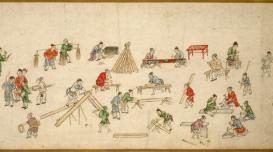Not all the campaigns of Qubilai were fought on the battlefield: in the Yuan relations with Southeast Asia, the game of diplomacy also played an important role. Taking the example of Annam as a case study, the project analyzes the impact of Qubilai’s diplomatic relations on the cross-cultural contacts between China and its neighboring regions. The diplomatic exchange with Annam not only constituted an important channel for exchanging goods and peoples between the two polities, but was also one of the channels where the founder of the Yuan dynasty sought his legitimation as emperor of China and of the Mongols. The project examines the entanglement between two facets of knowledge transfer as seen through records of Yuan diplomacy: the ideological intent of the Mongolian emperors, and its influence on more practical aspects of the transfer of technology, crafts, and goods between Yuan China and Annam. This second element builds upon the legacy of the maritime exchanges developed under the Song.
Through the analysis of several Yuan sources, the project focuses on two main aspects:
- The technologies of communication and the structures of government developed around and for diplomatic exchange in Yuan China.
- The specialties, social status, ethnicity, and role of the artisans and scholars requested as tributes.

